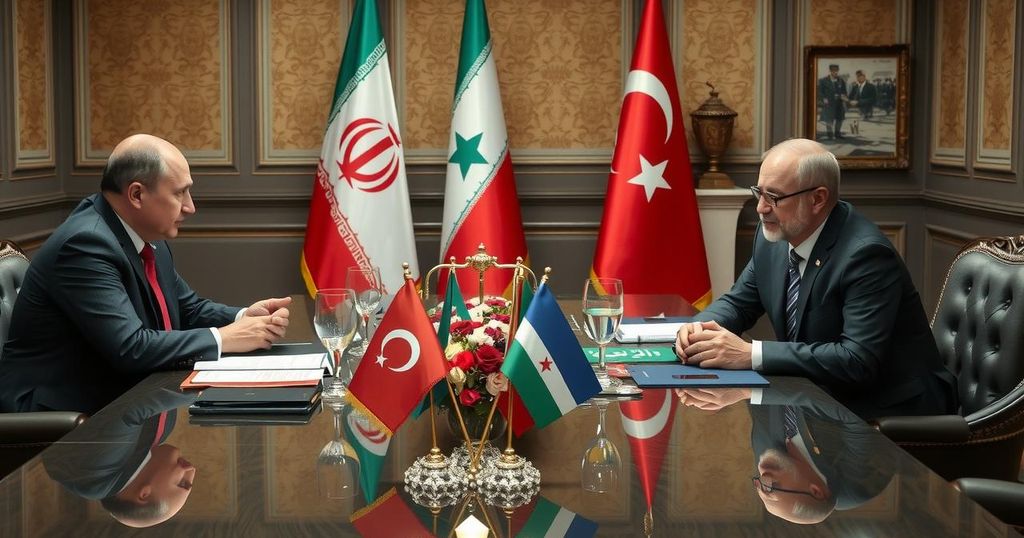World news
AGENCE FRANCE - PRESSE, ASIA, BASHA, BASHAR AL - ASSAD, CONFLICT, ERDOGAN, EUROPE, EUROPE/ASIA, FIGHTER JETS, HA, HAKAN FIDAN, HAMA, IRAN, MILITARY, REC, REUTERS, RUSSIA, SYRIA, SYRIAN CIVIL WAR, SYRIAN CONFLICT, SYRIAN NATIONAL ARMY, U. S. - BACKED SYRIAN DEMOCRATIC FORCES, UKRAINE, WAR
Marisol Gonzalez
0 Comments
Turkey, Russia, and Iran Prepare for Critical Talks on Syrian Conflict
Turkey, Russia, and Iran are set to meet in Qatar this weekend to address the implications of a recent HTS offensive that has shifted control in Syria. Their discussions, part of the Astana process initiated in 2017, aim to forge a unified response to ongoing challenges. Recent territorial gains by HTS have raised concerns over the future of Assad’s regime and stability in the region. The meeting underscores the complex interplay of local and international actors in Syria’s prolonged conflict.
This weekend, Turkey, Russia, and Iran are poised to convene in Qatar to strategize on their collective response to a significant rebel advance that has shifted the dynamics of the Syrian civil conflict, now in its thirteenth year. Their discussions will occur during the Doha Forum, which gathers high-ranking officials and thought leaders from over 150 nations to address shared issues. This meeting follows a notable escalation in clashes involving the Islamist group Hayat Tahrir al-Sham (HTS), which has recently succeeded in occupying Aleppo and moving toward Hama, a city maintained under government control since the onset of the civil war in 2011.
The Astana process, initiated in 2017 by Turkey, Russia, and Iran, was designed to facilitate a political resolution for the hostilities impacting Syria. Despite a ceasefire brokered by Turkey and Russia in 2020 that restored relative stability, the latest HTS offensives have yielded a new challenge, intensifying the urgency for trilateral talks. The leaders have acknowledged the changing situation, with Kremlin representatives emphasizing the necessity to curb aggression against the Syrian state.
As Turkey continues to navigate its support for the Syrian National Army, which opposes the U.S.-backed Syrian Democratic Forces, the country also expresses concerns regarding potential Kurdish autonomy bordering its territory. The complexity of the situation is exacerbated by the ongoing U.S. military presence in Syria, where around 900 troops support the SDF against ISIS remnants. The return of millions of Syrian refugees from Turkey remains critical and hinges on stabilization amid the ongoing conflict.
Former U.S. officials recognize the precarious balance Russia and Iran maintain concerning President Bashar al-Assad’s regime. While there are suggestions that HTS’s recent successes might compel a reassessment of tactics by Assad’s allies, others are uncertain of any lasting change in allegiance. Experts highlight that neither Russia nor Iran is poised to forfeit their regional footholds, given Syria’s strategic significance for both nations.
The conflict continues to be shaped by external influences, and concerns persist over the resurgence of ISIS amidst ongoing unrest. The predicament in Syria represents a multifaceted challenge, intertwining regional security concerns and humanitarian implications, particularly in relation to potential refugee flows.
Turkey, Russia, and Iran have been essential stakeholders in the Syrian civil war, which began in 2011. Turkey, supporting various rebel factions, seeks to limit Kurdish influence along its borders, while Russia and Iran back the Assad government. The Astana process, initiated in 2017, aims to create a collaborative framework for negotiating peace. Recent advancements by militant groups like HTS have disrupted previous agreements, prompting renewed discussions among the three nations to address the current crisis. The situation remains further complicated by the ongoing involvement of U.S. forces in support of local partners combating ISIS.
In conclusion, the impending talks in Qatar among Turkey, Russia, and Iran represent a critical juncture in their collective efforts to stabilize the shifting conflict landscape in Syria. The recent successes of HTS have escalated tensions and raised important questions regarding the future of Assad’s regime and the security of neighboring states. As diplomatic discussions unfold, the intertwined fates of refugee populations, Kurdish militias, and regional powers will remain paramount in shaping the future of Syria and the broader Middle East.
Original Source: www.voanews.com




Post Comment